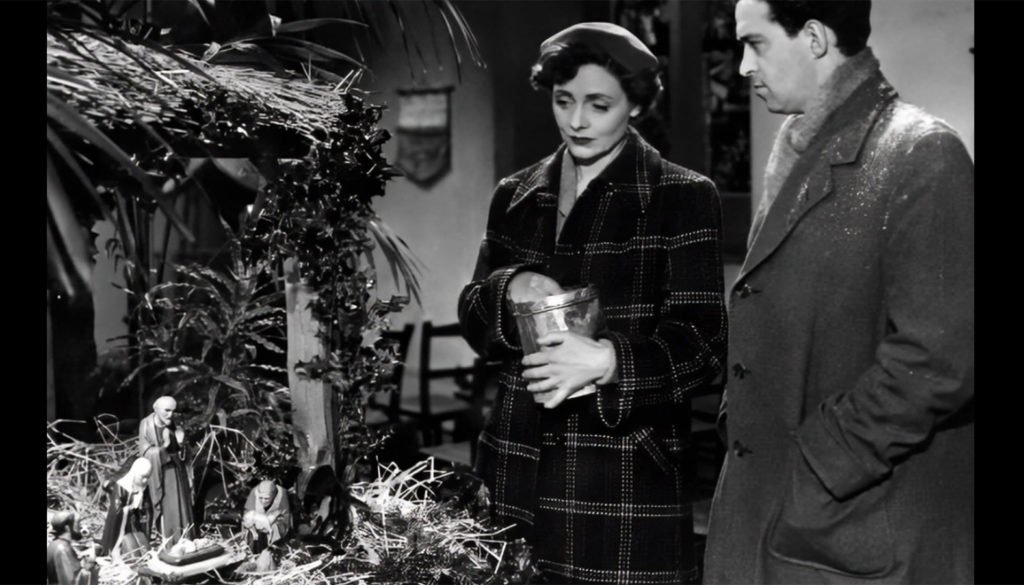A new book, out this month from Foster Hirsch, is called “Hollywood and the Movies of the Fifties: The Collapse of the Studio System, the Thrill of Cinerama, and the Invasion of the Ultimate Body Snatcher — Television” (Knopf, $38.68).
Finally, finally: I’m ahead of the curve.
“All About Eve,” “Anatomy of a Murder,” “Rear Window,” “The Night of the Hunter”: these are my mainstays. I just can’t get enough of those wide-screen black-and-white ’50s melodramas — and there are plenty outside the pantheon, too.
But I digress. It’s Christmas. “It’s a Wonderful Life” (1946) is of course obligatory this time of year.
Slightly more sophisticated and, in its way, just as moving is a superbly acted 1952 British film, directed by George More O’Ferrall and based on the 1950 play by Wynyard Browne: “The Holly and the Ivy.”
On Christmas Eve, the Gregorys convene at the family homestead in rural Norfolk. Holly and paper bells are being hung. A fire crackles. Tea is brought. Snow is stamped off boots as each guest arrives. Young carolers appear at the door.
Everyone has longed to be at Norfolk. No one wants to be alone at Christmas. But inside all is not well.
The renowned Sir Ralph Richardson is Martin, the recently widowed Irish pastor father.
Celia Johnson (of “Brief Encounter” fame) plays the dutiful daughter Jenny who wants to get married but is loath to leave her place at home.
Jenny’s younger sister Margaret (Margaret Leighton) is the fashion-conscious urban gadfly, in by train from London, who drinks too much, harbors a secret sorrow she feels she can’t share with the rest of the family — especially her father — and cannot possibly be called upon to help.
Michael (Denholm Elliott), Martin’s son, is a charmingly tippling soldier, home on 48-hour leave. His father wants to send him to university after his military service is completed, though Michael has zero interest and has additionally lost his faith. Margaret, after her ordeal, is also an atheist.
Two elderly aunts provide background. Bridget, Martin’s sister, did her duty by her own mother, staying home till the age of 45, and is now an embittered spinster overly attached to her cat. Aunt Lydia, also widowed and their late mother’s sister, is much softer. Given to dreamy soliloquies and much concerned with the younger generation’s happiness, she realizes that to have been loved, and to have loved, sustains a person for life.
The pastor is mild in temperament but oblivious. Coming in the door, he takes off his galoshes and casually hurls them across the room, calling for coffee and knowing Jenny will bring it.
A thousand sermons he’s preached and not one has been heard, he muses aloud, anticipating the Christmas service he’s to give the next morning
“That’s the worst of being a parson, nobody wants you. … If you don’t go near them, they say, ‘Here have I been in a place six months and the parson never comes near me.’ And if you do go, they say, ‘What’s he want to come poking his nose in here for?’ ”
He, too, is doing his duty, wearily resigned. He’s not exactly unhappy but he knows something is missing and he’s not sure what.
He’s also so blind to the hearts of the people around him that he doesn’t even know that Jenny and David (John Gregson), the engineer from down the lane, are madly in love and dying to be married.
David is leaving in a month for five years in South America so time is of the essence — but so much can’t be said! So much can’t be asked. So much can’t be aired. And Jenny can’t — won’t leave — unless Margaret or one of the aunts agrees to care for Martin.
A crisis occurs. Margaret and Michael take off for a local bar. When they return, Michael drunkenly blurts to his father, “You can’t be told the truth. You can’t be told the truth!” Can’t be told about Jenny, about Margaret, about Michael himself.
The pastor, appalled, replies, “D’you think because I’m a parson, I know nothing about life? ... That I couldn’t face realities?” But he’s also forced to recognize that his whole life, he’s been distorting and misrepresenting religion without knowing it.
Seventy years on, the movie’s themes are still relevant. Undisclosed secrets, simmering resentments, generational wounds, set-in-stone patterns of communicating and relating. Religion used as a barrier rather than an invitation. Vocational crises, grapples with faith, duty to God versus duty to family.
I won’t spoil the ending but suffice it to say everyone more or less gets what they want, everyone ends up at the early morning Christmas service, and the beautiful traditional carol has the last word:
“And Mary bore sweet Jesus Christ for to redeem us all.”
Bonus feature: a 21-minute short, free on YouTube, called “Star in the Night” (1945). Directed by Don Siegel, it’s a modern retelling of the Christmas story, set in an isolated motel-café in the desert Southwest. The characters are stock. The story lacks subtlety. The resolution is poor.
And I defy anyone to watch this small gem without weeping tears of wonder, comfort, and joy.

